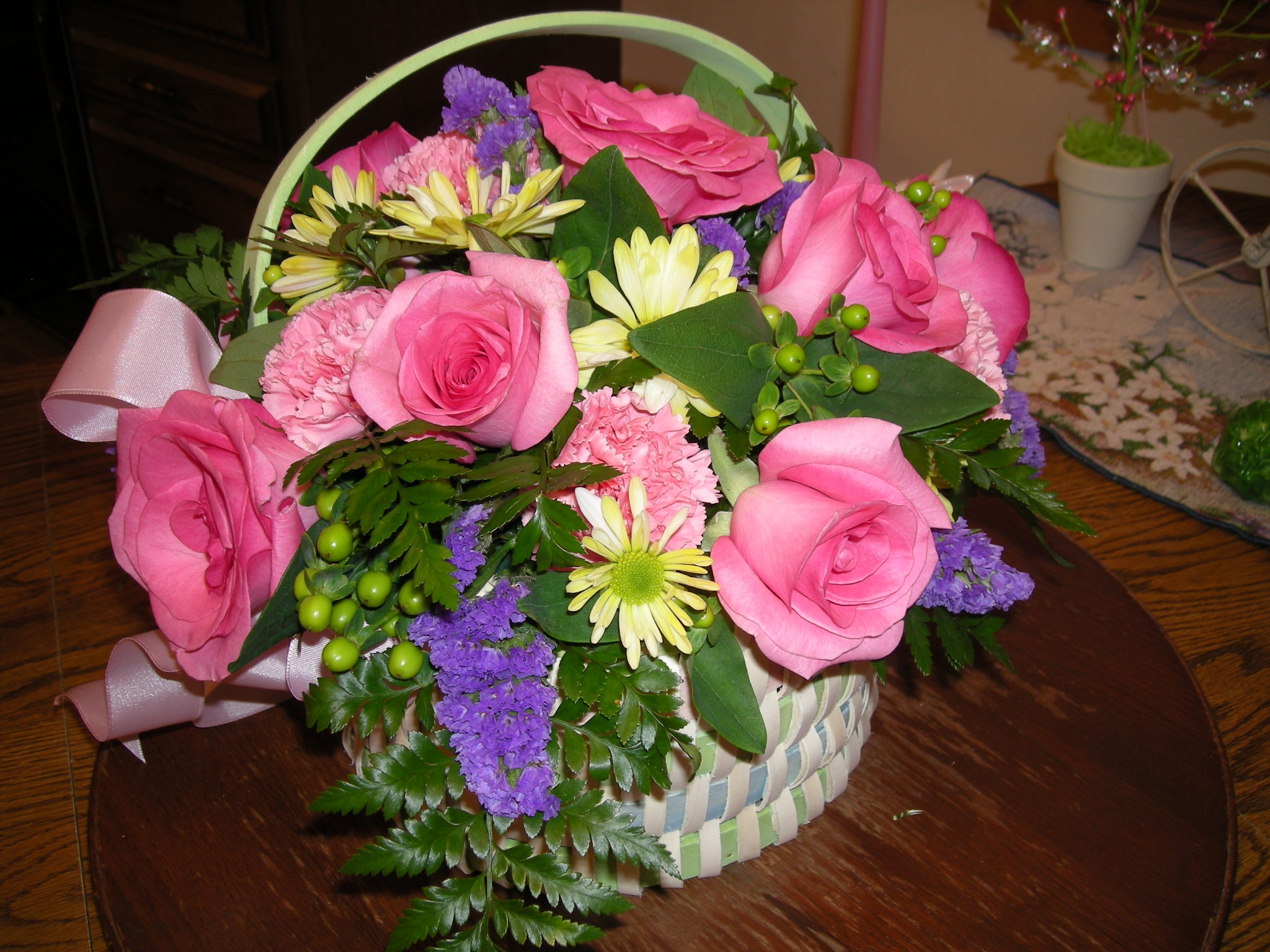
"BESSIE'S DEAR LOVE."
"COME, Bessie, that's all," said Laura to her little sister, who was peeping anxiously, now under pansy leaves, now behind rose-bushes, sometimes almost lost, mite that she was, in her eager search for more flowers.
"I wish we had a bushel-basket full every day; don't you, sister?"
"Yes, I guess they would all be wanted, pet."
"We'll plant a great many more seeds next year, won't we?"
"Yes." The little chatterbox kept on until they reached a school-building, which, during the vacation, was used for the every-day making up of bouquets which went to swell the quantity of country beauty and sweetness sent by kind hearts to the great city's sick poor.
Bessie worked away as industriously as any one, wishing she could go herself and see where her flowers carried happiness, and breathing over every bouquet a hope from the very depths of her tender little heart that a blessing might go with it.
"Look here, sister Laura," she whispered half shyly, one day, before going. "Would it do any harm if I should put these in my bouquets?"
"What, Bessie?" She looked at some narrow slips of paper on which the little girl had laboriously printed, in scraggy, uneven, but distinct letters,—
"WITH BESSIE'S DEAR LOVE."
"They won't show, you know," she went on;
"only I thought perhaps some little girl might be looking so hard at her flowers, if she was very fond of them, that she might see that somebody loved her, and it might make her glad."
"Put them in, Bessie; I'm sure they will.
And the love messages were carefully tied in.
A cheery-faced woman carried a basket into a children's hospital. The glaring rays of the July sun were shut out, and coolness and freshness secured as far as was possible; but still the breath of the city air seemed stifling to the little ones, who turned eagerly to receive each a gift from the ready hand. At every pillow she left enough brightness to bring smiles upon the wan faces, and still plenty remained to go into another room, where were a few of the more seriously ill.
"How are you today?" asked the bearer, softly laying her hand on the feverish cheek of the thin-faced girl, whose eyes met hers full of a restless longing.
The only answer was a weary shake of the head. The visitor sat down beside her.
"And is there no light within, poor child?
The dear Master—have you no place in your poor heart for him yet? He loves you; he died to save you; he is watching over you; he will keep close at your side, and help you through all you may have to suffer. Cannot you love him?"
"I ain't never seen him, you know," said the girl, pitifully. "How can I? I love you, 'cos I've seen you and you're good to me."
"But he sent me to you, and put the love in the hearts which were moved to send you these.
Cannot you love him because he loved you first?"
"I'd like to—I'll try. But if I could only see him!"
More words of comfort and encouragement were spoken, and then the poor girl was left with the flowers in her hand.
The cool faces of the pansies seemed almost to smile in her eyes in sympathy. As she pressed her flushed face against the heliotropes and sweet peas, to feel their freshness and to breathe their sweetness, something less soft than they, touched 'her cheek. Looking curiously, she drew out a scrap of paper, crumpled, and partly wet with the sprinkling the flowers had received.
If writing had been on the paper, she could not have read it, but smoothing it carefully out, she spelled the words,—
"With Bessie's dear love."
"Who could 'a' put it there?"
The hours dragged heavily, and even so small a ripple of excitement was welcome. She gazed at it with feelings, which grew more and more serious.
Who was Bessie? Whom did she love, and why?
Could it be herself? Bessie must be a child, she knew; grown people did not print letters that way. And as she pictured to herself the little fingers, which must have tied in the message at the dictates of such a far-reaching love, the tears came to her eyes. This, child's loving thoughts had surely followed wherever her flowers might go.
How the sick girl, wished the little thing might come to her, so that she could tell her how she
loved her!
And then into her softened heart came crowding thoughts of Him who had given her not only a bunch of flowers, but everything—himself—the hope of heaven. How could she refuse to say she loved him?
When her kind friend came to her again, there was a new expression of peace on her wasted face.
"I can love him without seeing him," she said quietly "but he comes so near to me sometimes
that I think I can almost see him."
Little Bessie continues to write her love-messages to unknown sufferers, taking to her self great comfort in the full confidence that they must sometimes reach some one who will be glad to know that she loves them. And her faith will not be shaken, even though she may never hear again from any of her sweet words until she and those whose sorrowing hearts they have reached shall meet before the throne of Him whom not having seen we yet love.
Selected.